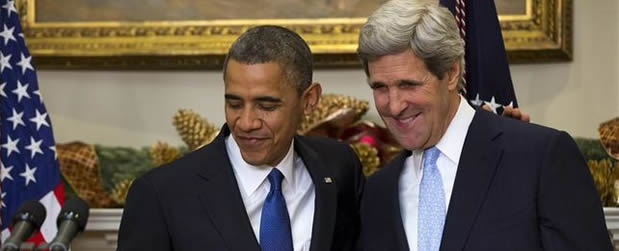
Deciphering diplo-speak on Cuba
By Richard E. Feinberg
Diplomats often speak with purposeful ambiguity, to please multiple audiences and to not give away their hand prematurely. But a careful parsing of diplo-speak can offer valuable clues in anticipating future policy moves.
In what was billed as a major statement on U.S. policy toward Latin America and the Caribbean, earlier this week Secretary of State John Kerry included four substantive paragraphs on Cuba — which were largely misinterpreted by the U.S. media.
In Miami a few days before, in what according to administration sources were “off the cuff” remarks at a fundraiser, President Barack Obama hinted that he was considering revising policies toward Cuba. “We have to be creative and we have to be thoughtful, and we have to continue to update our policies,” he said.
John Kerry added meat to those remarks, detailing reforms underway in Cuba — the reforms that presumably sparked the president to want to “update” U.S. policies.
First, Kerry explained the improved, more pragmatic tone of U.S.-Cuban relations: “Our governments are finding some cooperation on common interests at this point in time. Each year, hundreds of thousands of Americans visit Havana, and hundreds of millions of dollars in trade and remittances flow from the United States to Cuba. We are committed to this human interchange . . . ”
Kerry then threw this bouquet to the Cuban government: “ .. . we also welcome some of the changes that are taking place in Cuba which allow more Cubans to be able to travel freely and work for themselves.”
With good reason, the administration believes it can take some credit for some of the positive changes underway in Cuba — especially the significant growth of the private sector and the allied middle classes. As a result of earlier administration decisions to selectively loosen U.S. economic sanctions against Cuba, U.S. visitor dollars and remittances by Cuban-Americans are fueling the emerging entrepreneurs on the island.
Kerry then went on to criticize the non-democratic nature of the Castro regime — hardly news, yet the thrust of much of the media coverage of the speech. Phrases no doubt intended to please the anti-Castro Cuban-Americans in South Florida and their allies on Capitol Hill. What the media missed was an appreciation for Kerry’s careful choice of words.
Kerry labeled the Cuban government “authoritarian,” a much softer term than the traditional “totalitarian” or “communist.” “Authoritarian” puts Cuba in the same camp as, say, the Russia of Vladimir Putin or the Venezuela of Nicolás Maduro and Hugo Chávez — regimes we definitely don’t like but with which we do business every day.
Kerry then called on the Cuban government to “embrace a broader political reform agenda: and if more does not change soon, it is clear that the 21st century will continue, unfortunately, to leave the Cuban people behind.” But unlike the U.S. embargo legislation, the secretary of State did not call for the immediate resignation of President Raúl Castro. Rather, “more should change.” Kerry seemed to be suggesting that the U.S. would accept — perhaps even prefer — a more gradual transition rather than sudden upheaval.
For the United States, gradual change in Cuba entails fewer risks. Sudden regime transformation might carry a superficial appeal, but it could entail political instability and unpredictable violence, social disarray opening space for international criminal syndicates, and even irresistible pressure for international to quall civil strife and halt a mass exodus of refugees. Unguided regime collapse in Havana could become a monumental headache for Washington.
Many in the administration understand that the best strategy for promoting gradual political liberalization in Cuba is to help build an independent private sector and modern middle classes that aspire to greater individual autonomy, economic opportunity, and material prosperity — and who will seek a Cuba that is more “normal,” more like other societies in the Caribbean basin where individuals have access to middle-class consumption patterns and can pursue their talents and careers independent of state control.
Neither Obama nor Kerry have told us just what new initiatives they may be contemplating, as they seek to build on their initial successes in nudging Cuba toward more pragmatic diplomacy and more forward-looking economic reforms. But we should read in their diplo-speak that they are signaling new approaches: rhetoric and policies that recognize that Cuba is changing before our eyes, that favor selective engagement over blanket sanctions, and that appreciate that gradual economic change in Cuba today is the more realistic path toward political evolution tomorrow.
Richard E. Feinberg is a professor at the UC San Diego and served as the Latin American expert on President Bill Clinton’s National Security Council. His most recent publication is “Soft Landing in Cuba? Emerging Entrepreneurs and Middle Classes.”
(From The Miami Herald)

